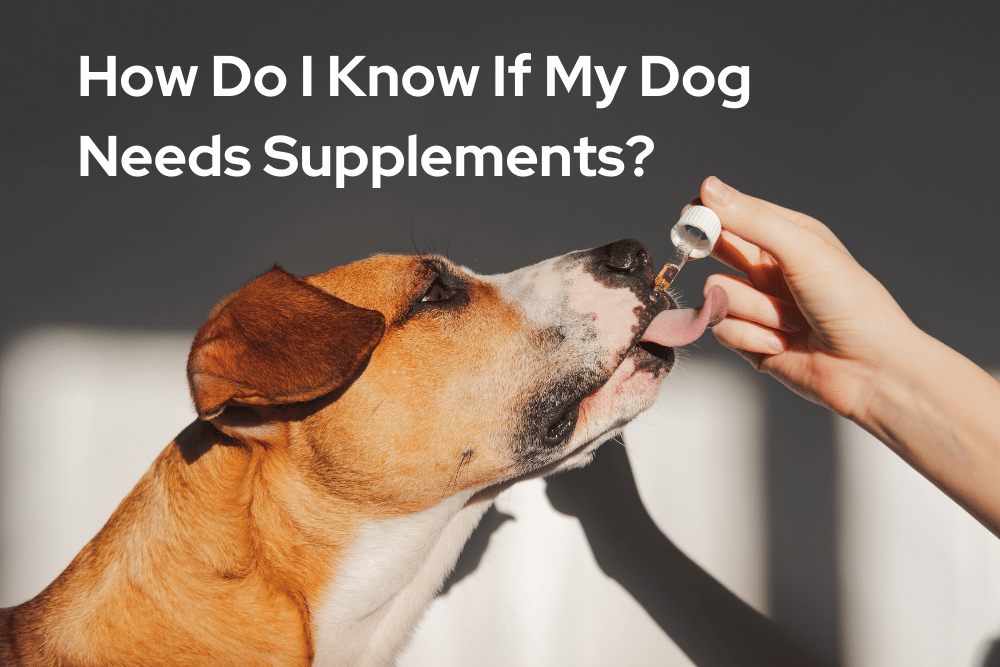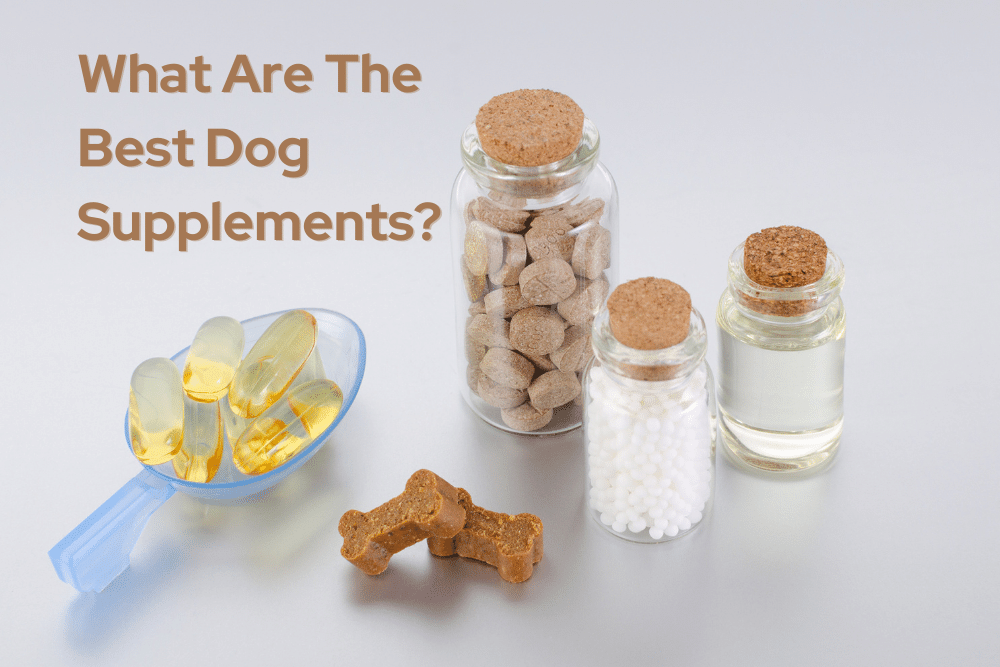You know that nutrition is everything when it comes to giving your dog a healthy life full of vitality and longevity. And you’re committed to providing her with the best of everything because that’s the kind of pup parent you are. But nutrition is complex. From deciding on the best food to researching the best dog supplements, there’s a lot to consider.
In an ideal world, dogs would rule, humans would all get along, and food sources would be perfectly balanced in terms of nutrition. At least that’s what we learned from a recent survey of a million dogs worldwide.
But alas, nothing is that simple.
And deciding on the best diet and choosing the best nutritional supplements for your dog are no exception.
What are supplements for dogs?
Just as with supplements for humans, supplements for dogs are additions to their regular diet. The purpose of a supplement is to provide a boost where certain nutrients may be lacking, or certain therapeutic benefits may be needed.
However, a “multi-vitamin” for you is not the same as a “multi-vitamin” for your furry friend. So, unless you are otherwise directed by a veterinarian, you and Fluffy get your own supplement shelves in the pantry.
Why would my dog need supplements?
You might be saying, “My dog eats better than I do!”
Supplements for dogs fall into two categories: dietary and therapeutic.
While the functions and benefits of the two are not mutually exclusive, they do have different purposes that will help guide your choices.
Dietary supplements, such as dog probiotics and vitamins, help to boost the amount and/or absorption of specific nutrients.
Therapeutic supplements are intended to help prevent or treat diseases or specific conditions.
Unless your dog has health issues during her younger years, therapeutic supplements will become a bigger part of her life in her senior years. Common examples include supplements for heart health, cognition and brain health, and arthritis.

How do I know if my dog needs supplements?
Aaahhh, the million-dollar question!
Technically, commercially prepared dog foods are nutritionally balanced for all specific life stages, breed sizes, and activity levels.
That means your puppy’s food will be formulated for its fast growth and energy needs, from vitamins and minerals to proteins and fats.
These formulas will shift as your dog becomes an adult and later as she becomes a senior.
Sounds simple, doesn’t it?
In some ways it is.
But narrowing down the best nutritional supplements for dogs calls upon us guardians of these companions to do our homework.
For example, nutrients are only as useful as the body’s access to them. And this bioavailability is what puts the asterisk next to “nutritionally complete.”
Both veterinary nutritionists and “people” nutritionists vouch for the superiority of nutrients in food over those in supplements.
Why?
In part because they are complemented by micronutrients that increase the bioavailability, absorption, and efficacy of the nutrients.
That’s why supplements like vitamins usually have astronomical quantities of certain nutrients: Only so much is going to make it through.
When it comes to vitamins for dogs, you could actually do more harm than good by adding a multivitamin for dogs into Fluffy’s diet.
Case in point: In a large breed puppy, too much calcium could accelerate an otherwise healthy growth rate and cause crippling hip dysplasia. (Too little calcium could cause its own set of problems.)
Choosing the best vitamins for dogs
So why bother worrying about finding the best vitamins for dogs, for example, if they’re already formulated in a dog food I can buy?
Another million-dollar question.
If you are not feeding a formulated food but are instead feeding a home-prepared diet, you will definitely need to supplement.
But how are you going to know the best supplements for homemade food?
That determination isn’t as simple as searching for the best multivitamin for dogs.
(There’s a reason that veterinary nutritionists guide the formulation of animal diets, for both healthy and infirmed animals.)
Kibble, on the other paw, is the most common and convenient form of processed dog food.
But the extrusion process used to produce it involves extremely high temperatures at multiple stages of production. How “alive” are those nutrients likely to be by the time they’re in the bag?
Also, with the increasing demand for higher meat content (vs. meals and other dry ingredients) in food, the risk of biological pathogens increases. Listeria, salmonella, E. coli, and mold have all been found in extrusion-processed dog foods.
So back to the question of choosing the best supplements for your dog without giving her what could be imbalanced or dangerous….

So, what are the best dog supplements?
Nutritional supplements for dogs contain 4 main types of ingredients: antioxidants, fish oil, glucosamine, and probiotics and prebiotics.
- Antioxidants help to eliminate free radicals that destroy cellular membranes.The resulting cell death caused by free radicals can lead to accelerated aging, memory loss, and other serious issues like heart disease and cancer.Three of the major antioxidant vitamins are beta-carotene, vitamin C, and vitamin E.
- Fish oil is a good daily supplement to add to your dog’s diet because of its omega-3 fatty acid content.Many dog foods contain an imbalanced abundance of omega-6 fatty acids. So fish oil can help bring the two fatty acid types back into balance.It can also help to maintain a shiny coat, prevent itching from allergies and dryness, reduce inflammation, support heart and kidney health, and help relieve arthritis.
Salmon, sardine, and anchovy oils are good examples that can be rotated for more complete supplementation.
- Glucosamine is an amino sugar sourced from shellfish or synthesized in a lab.It is a component of the fluid that helps build up cartilage that in turn provides cushioning between bones.Glucosamine is most often paired with chondroitin, which can be helpful to dogs with arthritis, especially in their senior years. The combination is one of the best joint supplements for dogs.
As with any supplement, consult with your vet to make sure glucosamine (-chondroitin) is appropriate for your dog, given its sugar foundation.
- Probiotics and prebiotics are essential to maintaining a healthy gut biome.Remember all that absorption talk? Well, bacteria in the colon are the gatekeepers.Most of us are familiar with the live culture probiotics found in yogurt and other fermented products.
These live microorganisms are essential for more than just a healthy GI tract. They influence the health of the entire body and are essential for a healthy immune system.
Prebiotics are not living like probiotics are, but they provide necessary nourishment for the living microorganisms.
Fortiflora is an example of a probiotic/prebiotic formula.
When it comes to choosing the best nutritional supplements for dogs, be clear about why you are adding supplementation.
Young, otherwise healthy dogs shouldn’t need supplementation beyond those mentioned above, unless directed by your vet.
As your dog reaches her senior years, specific supplementation will likely be warranted.
And your vet will be your best resource for ensuring all of Fluffy’s food, supplements, and medications work together safely for her best life.








